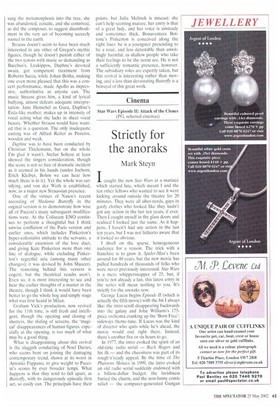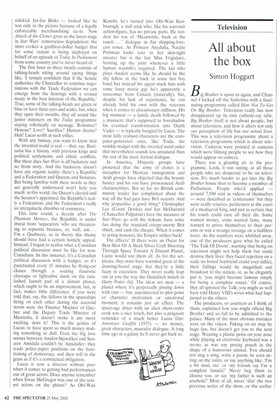Strictly for the anoraks
Mark Steyn
Icaught the new Star Wars at a matinee which started late, which meant I and the ten other fellows who wanted to see it were kicking around outside the theatre for 20 minutes. They were all uber-nerds, guys in goofy clothes who looked like they hadn't got any action in the last ten years, if ever. Then I caught myself in the glass doors and realised I looked just the same. As it happens. I haven't had any action in the last ten years, but I was not hitherto aware that it looked so obvious.
I dwell on the sparse, homogeneous audience for a reason. The trick with a franchise is to grow it. Spider-Man's been around for 40 years, but the new movie has pulled hundreds of thousands of folks who were never previously interested. Star Wars is a mere whippersnapper of 25, but, if you're not already a fan, this latest entry in the series will mean nothing to you. It's strictly for the anoraks now.
George Lucas begins Episode II (which is actually the fifth movie) with the bit I always like: the intro scroll disappearing backwards into the galaxy and John Williams's 173piece orchestra cranking up the 'Born Free'sideways theme-tune. If Lucas was the kind of director who quits while he's ahead, the movie would end right there. Instead, there's another five or six hours to go.
In 1977, the intro evoked the spirit of an old-time radio serial — Buck Rogers and his ilk — and the cheesiness was part of its rough'n'ready appeal. By the time of The Phantom Menace in 1999, the intro evoked an old radio serial suddenly endowed with a billion-dollar budget: the lavishness buried the charm, and the non-funny comic relief — the computer-generated Gungan sidekick Jar-Jar Binks — looked like he was only in the picture because of a legally enforceable merchandising tie-in. Now Attack of the Clones gives us the latest stage in Star Wars' remorseless degradation: the intro evokes a gazillion-dollar budget that for some reason is being deployed on behalf of an episode of Today In Parliament from some country you've never heard of.
The first hour or three mostly consists of talking-heads sitting around saying things like, 'I remain confident that if the Senate authorises the Chancellor to continue negotiations with the Trade Federation we can emerge from the hearings with a revised treaty in the best interests of the Republic.' True, some of the talking-heads are green or blue or have three eyes and scales, but, when they open their mouths, they all sound like junior ministers on the Today programme staying robotically on message. Romance? Honour? Love? Sacrifice? Human drama? Hall! Lucas scoffs at such trifles.
With any fantasy, you want to know that the invented world is real — that, say, Ruritania has a history, with previous kings and political settlements and ethnic conflicts. But these days Star Wars is all backstory and no front story. And the backstory doesn't have any organic reality: there's a Republic and a Federation and Queens and Senators. But being familiar with these words as they are generally understood won't help you much: in this world, the Queen's elected and the Senator's appointed, the Republic's really a Federation, and the Federation's really an intergalactic chamber of commerce.
This time round, a decade after The Phantom Menace, the Republic is under threat from 'separatists' who are threatening to separate because, er, well, urn ... I'm a Quebecer, so in theory this theme should have had a certain homely appeal. Instead, I began to realise what a Canadian political discussion must be like for nonCanadians. In this instance, it's a Canadian political discussion with a budget, so it's punctuated every 15 minutes by flying-car chases through a soaring futuristic cityscape or lightsabre duels on the rainlashed launch pad of a distant planet, which ought to be an improvement, but, in fact, makes little difference: if you were told that, say, the fellows in the spaceships firing on each other during the asteroid storm were the Finance Minister of Quebec and the Deputy Trade Minister of Manitoba, it doesn't make it any more exciting, does it? This is the genius of Lucas: to have spent so much money making something so dull. Even the big love scenes between Anakin Skywalker and Senator Amidala couldn't be Amiduller: they trade policy-paper positions on the functioning of democracy, and then roll in the grass as if it's a contractual obligation.
Lucas is now a director without peer when it comes to getting bad performances out of great actors. Does anyone remember when Ewan McGregor was one of the sexiest actors on the planet? As Obi-Wan Kenobi, he's turned into Obi-Wan Kenbranagh, a dull stick who, like his souvenir action-figure, has no private parts. He renders his ton of 'Meanwhile, back at the ranch ... ' dialogue in flat shipping-forecast tones. As Princess Anydulla, Natalie Portman looks cute in her skin-tight sweater but is the fair Miss Frigidaire, frosting up the joint whenever a little human warmth's required. The kid who plays Anakin seems like he should be the shy fellow in the back in some hot boy band but instead his agent stuck him with some lousy movie gig: he's apparently a newcomer from Canada (naturally), but, despite his lack of experience, he can already hold his own with the veterans when it comes to elocutionary stiffness. His big moment — a family death followed by a massacre that's supposed to foreshadow his eventual transformation into Darth Vader — is typically bungled by Lucas. The most fully realised characters are the computer-generated ones, like Yoda, the wrinkly midget with the inverted word order that nevertheless sounds less unnatural than the rest of the inert, formal dialogue.
In America, Hispanic groups have protested that the army of clones is a metaphor for Mexican immigration and Arab groups have objected that the bounty hunter and his son have pronounced Arab characteristics. But so far no British community leader has complained about the way all the bad guys have Brit accents. And why jeopardise a good thing? Christopher Lee (Count Dooku) and Ian McDiarmid (Chancellor Palpatine) have the measure of Star Wars: go with the hokum, have some fun doing the standard creepy-snooty Brit shtick, and cash the cheque. When it comes to acting honours, the Empire strikes back!
The effects? If there were an Oscar for Best Shot Of A Sleek Silver Craft Shooting Through Space Toward A Distant Planet, Lucas would win them all. As for the setpieces, they must have sounded great at the drawing-board stage, but they're a little fuzzy in execution. They never really leap out at you the way the Quidditch match in Harry Potter did. The ideas are neat — a planet where it's perpetually pissing down with rain — but, unconnected to plot point or character motivation or emotional moment, it remains just an effect. The space-age diner with an alien short-order cook was a nice touch, but also a poignant reminder of a much better Lucas film: American Graffiti (1973) — no money, great characters, muscular dialogue. A long time ago in a galaxy he'll never get back to.























































































 Previous page
Previous page